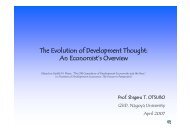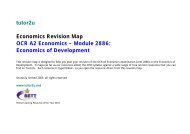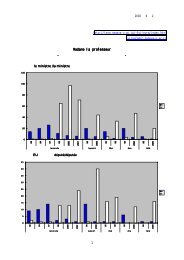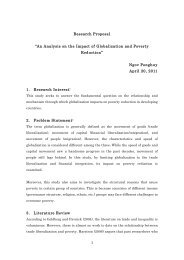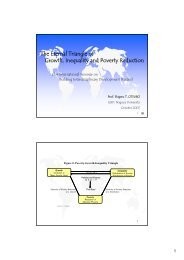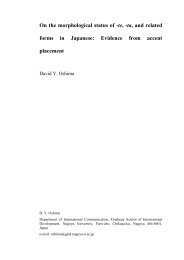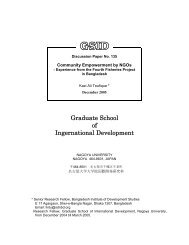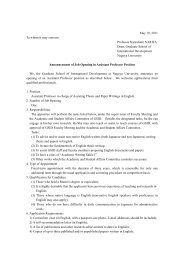Report
Report
Report
You also want an ePaper? Increase the reach of your titles
YUMPU automatically turns print PDFs into web optimized ePapers that Google loves.
130 QUANTIFICATION OF BENEFITS FROM ECONOMIC COOPERATION IN SOUTH ASIA<br />
tourism studies was established at the Institute of<br />
Higher Education to develop trainees for the tourism<br />
industry.<br />
According to the World Bank, Maldivian workers<br />
follow extensive training programmes, since there is a<br />
perception that quality of service is important. The<br />
industry is addressing quality in several ways. First,<br />
the faculty of hospitality and tourism studies in the<br />
Maldives College of Higher Education, in partnership<br />
with the Birmingham College of Food, Tourism and<br />
Creative Studies, is working hard to improve training<br />
for the industry. In turn, the EdExcel Foundation in<br />
the United Kingdom approves standards.<br />
The World Bank further adds that the resort chains<br />
in the Maldives are also sponsoring training in the<br />
country as well as overseas. The companies consider<br />
human resource development critical. There is a high<br />
level of training, with more than half of the staff having<br />
received training on the job. External training is<br />
particularly high and, indeed, many firms do send their<br />
employees overseas for training (often to Singapore).<br />
Unskilled employees, however, receive less training and<br />
this is probably where more emphasis should be given.<br />
The tourism industry relies heavily on foreign labour;<br />
some 45% of workers are expatriates.<br />
In order to overcome the obstacle relating to the<br />
shortage of skilled labour the Maldives should<br />
undertake commitments under Mode 4 both in tourism<br />
and education services. While foreign-skilled labour in<br />
the tourism industry can help sustain the high growth<br />
rate, in the long run it should develop its education<br />
system in such a way that it produces sufficient skilled<br />
labour for its tourism industry. Thus liberalisation of<br />
these two sectors – tourism and education – for the<br />
movement of various categories of persons seems crucial<br />
for the Maldivian economy. In tourism education there<br />
is an urgent need to develop collaborative arrangements<br />
between the Maldives and other South Asian countries<br />
for providing education and training to tourism<br />
professionals. Moreover, at a lower skill level, workers<br />
employed in the Maldivian tourism industry need<br />
training which could also be provided by South Asian<br />
countries. Thus it could be suggested that the Maldives<br />
should undertake commitments in all sub-sectors of the<br />
tourism sector. This will help in meeting its demand<br />
and also enable it to sustain the high growth rate. As it<br />
currently lacks the required capacity to deal with WTO<br />
negotiations, it may find it easier to be engaged in<br />
regional negotiatioins that will also help it<br />
multilateralise its regional commitments if it so desired<br />
in due course of time.<br />
Summary of Restrictions in the Maldivian<br />
Tourism Sector<br />
• No commitments in the tourism sector- neither<br />
sectoral nor horizontal<br />
• Access to finance<br />
• High cost of finance<br />
• Access to land<br />
• Shortage of skilled labour<br />
• All non-Maldivian citizens (unless holding a<br />
resident permit) staying in registered tourist resorts,<br />
hotels, guesthouses, and tourist-accommodating<br />
vessels pay the bed tax may be considered a nontariff<br />
barrier. In addition, it is a flat rate, the ad<br />
valorem incidence of the levy, which depends upon<br />
the room rate, falls more heavily on the cheapest<br />
resorts.<br />
Bhutan<br />
In its offer on services as part of accession negotiations<br />
Bhutan has proposed to undertake commitments in only<br />
one of the four sub-sectors of tourism – hotel and<br />
restaurant services. Thus its proposed commitments<br />
cover hotels and restaurants (excluding nightclubs)<br />
(CPC 641), food serving services (CPC 642), and beverage<br />
serving services for consumption on the premises<br />
(CPC 643). In the committed sub-sector under Market<br />
Access column, Bhutan has no restrictions under Modes<br />
1 and 2 and under Mode 3 establishment would be<br />
limited to hotels with maximum capacity of 50 rooms<br />
in urban areas and a maximum capacity of 15 rooms<br />
in rural areas. Mode 4 is unbound and refers to the<br />
horizontal section. In the National Treatment column<br />
Modes 1, 2, and 3 are without any restrictions and<br />
Mode 4 is unbound except as in the horizontal section.<br />
In the horizontal section under Mode 3 Bhutan has<br />
allowed FDI with minimum size of foreign investment<br />
of $0.5 million and foreign equity limited to 70%. Also<br />
the business has to be incorporated in Bhutan. In the<br />
National Treatment column foreign investors are<br />
required to foster transfer of technology, introduction<br />
of management skills and provide training and employ<br />
Bhutanese nationals at all levels in the enterprise. In<br />
addition, the shares held by foreign nationals and<br />
juridical persons in locally incorporated companies are<br />
not transferable without permission by the government<br />
of Bhutan.<br />
From the analysis of the Bhutanese offer in services<br />
it appears that its commitments are limited to just one<br />
sub-sector of the tourism sector. In the committed sub-




